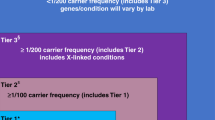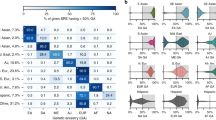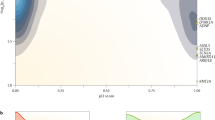Abstract
Disclaimer: This guideline is designed primarily as an educational resource for medical geneticists and other health care providers to help them provide quality medical genetic services. Adherence to this guideline does not necessarily assure a successful medical outcome. This guideline should not be considered inclusive of all proper procedures and tests or exclusive of other procedures and tests that are reasonably directed to obtaining the same results. In determining the propriety of any specific procedure or test, the geneticist should apply his or her own professional judgment to the specific clinical circumstances presented by the individual patient or specimen. It may be prudent, however, to document in the patient's record the rationale for any significant deviation from this guideline.
Similar content being viewed by others
Main
Diseases commonly grouped together as “Jewish Genetic Disorders” (JGDs) range in incidence from 1/900 to 1/40,000 in the Jewish community, specifically those individuals of Ashkenazi (eastern European) heritage. Although some of these disorders in isolation would be considered rare, the overall carrier rate in this population is significant, with between 1 in 4 and 1 in 5 Ashkenazi Jews carrying a mutation for any one of these disorders. Because of genetic drift in combination with historical and social factors, certain autosomal recessive disorders have been found to occur at a higher incidence (e.g., Tay-Sachs disease) or almost exclusively in this population (e.g., familial dysautonomia) whereas other disorders may be as common as in other high risk groups (e.g., cystic fibrosis). However, the commonality for JGDs is that all exhibit the founder mutation phenomenon whereby only 1–3 mutations account for the vast majority of deleterious alterations found in this specific population.
Over 30 years ago, the development of an accurate and reliable biochemical test led to a remarkably successful community carrier screening program for Tay-Sachs disease. The subsequent widespread adoption of Tay-Sachs carrier screening resulted in a significant drop in this disease among the Ashkenazi Jewish population. Today, the vast majority of children born with Tay-Sachs disease have non-Jewish parents. Advances in our understanding of the molecular biology of Tay-Sachs disease and other Jewish genetic disorders have resulted in the identification of many of the “founder” mutations present in this population (Table 1).
As technology has improved, our ability to perform carrier screening for an increasing number of disorders has likewise expanded. However, there has been debate as to which disorders should be included in preconception/prenatal carrier screening panels and what criteria should be used to determine how this selection is made. In addition, it is important to take into account the needs of the community for which screening is intended (see commentary in this issue, page 33). Although there is no definitive mechanism whereby any individual or organization can speak for a population as a whole, experience both in the United States and Israel points to overall acceptance of carrier screening in the Jewish population if done with sensitivity and respect for cultural and religious differences. Several support groups have taken it upon themselves to educate the community and professionals about the need for comprehensive testing and prevention. The ultra-orthodox Dor Yeshorim program has advocated for broad-based testing for decades and the Central Conference of American Rabbis, the rabbinic arm of the Reform Movement, North America's largest Jewish denomination, has passed a resolution urging all Reform Rabbis to counsel prospective couples on the availability of testing. Thus, the community focus is on the accuracy of the test and its ability to prevent significant disease as opposed to “cherry picking” disorders based on overall incidence or rarity.
This document seeks to provide guidance to clinicians regarding prenatal/preconception carrier screening for Ashkenazi Jewish individuals; however, new discoveries and technological advances will inevitably result in the availability of additional tests and revised recommendations in the future.
Recommendations
-
1
We recommend that carrier screening for cystic fibrosis, Canavan disease, familial dysautonomia, and Tay-Sachs disease be offered to all Ashkenazi Jews who are pregnant or considering pregnancy, according to current American College of Medical Genetics and/or the American College of Obstetricians and Gynecologists (ACOG) guidelines. In addition, we recommend that carrier screening be offered for Fanconi anemia (Group C), Niemann-Pick (Type A), Bloom syndrome, mucolipidosis IV, and Gaucher disease. Carrier screening for these disorders should include testing for the specific mutations listed in Table 1, which will result in a carrier detection rate ≥ 95% for most disorders. As a result, even in disorders that are relatively less common, expected mutation-specific carrier frequencies are relatively high.
-
2
Additional disorders will be considered for addition to this panel based on the following:
-
a
The natural history of the disorder should be well understood and carry a potential for significant morbidity and/or mortality in the homozygous or compound heterozygous state.
-
b
Based on available scientific literature there should be either > 90% detection rate or an allele frequency of ≥1% in the Ashkenazi Jewish population. Although there may be sound reasons to reconsider these thresholds in the future, they appear to be rational and appropriate at this time. As always, any such testing should meet the highest standards of quality as detailed in the companion laboratory guidelines.
-
a
-
3
The offering of such testing should ideally take place before pregnancy, thereby giving individuals time to make appropriate reproductive decisions based on their own personal choices and cultural backgrounds. Currently, the majority of testing takes place in the primary care obstetrical setting and not in the medical genetic specialty environment. However, regardless of the clinical setting, adequate counseling should be provided to anyone considering testing so that choices are truly “informed.” Counseling should include the following:
-
a
A general description of the disorders should be provided. Audiovisual materials are available and brochures, videos etc., can supplement the discussion.
-
b
Whereas some of these disorders are associated with consistent symptoms and findings, others have imprecise phenotype/genotype correlations with the possibility of mild disease.
-
c
Although detection rates are excellent overall, counseling must include an understanding that in the case of a negative test, a residual risk remains.
-
d
A carrier of a gene mutation for an autosomal recessive disorder is a healthy individual who is not at risk of developing the disease but has a risk of passing the gene mutation to his/her offspring.
-
e
The success of the Tay-Sachs screening program has resulted in the possible misperception that the Tay-Sachs gene is no longer present in the Ashkenazi Jewish community. Because a carrier is asymptomatic, screening by necessity should occur in every generation. Furthermore, some individuals are aware that they or their parents may have been tested for Tay-Sachs disease in the past, possibly through community testing programs. If documentation is not available, it is appropriate to offer repeat testing.
-
f
Formal genetic counseling and medical genetic consultation should be readily available to anyone desiring this service.
-
a
-
4
If only one member of a couple is of Ashkenazi Jewish background, testing should still be offered. Ideally, the Jewish member of the couple should be tested first. If the Jewish partner has a positive test result, the other partner (regardless of background) should be screened for that particular disorder. In the case of Tay-Sachs disease, testing can be performed using the biochemical assay, which has an excellent detection rate regardless of ethnic or racial background. The mutation detection rate and carrier frequency among different ethnic/racial groups is known for cystic fibrosis; however, for the other disorders, a discussion should include the lack of a precise residual risk in the case where the non-Jewish partner is negative on mutation analysis.
-
5
Generally, individuals self-identify themselves as Jewish and whether or not they are of eastern European origin. One Jewish grandparent is sufficient to offer testing. However, if someone is unsure as to their precise lineage, it is recommended to offer testing. At this time, there is no specific panel of tests available for Jews from non-Ashkenazi background. However, a proper family history and ethnic origin should still be obtained and appropriate testing offered (e.g., hemoglobinopathy screening for those from the Mediterranean basin).
-
6
In the case where someone is identified as a carrier, genetic counseling should be readily available to discuss the findings and possible reproductive options. Furthermore, a discussion regarding the importance of genetic counseling for other family members should be stressed. Although the provider can not contact family members directly, the individual should be encouraged to discuss the findings with his or her family if possible and appropriate.
-
7
At present, many laboratories offer these tests as a panel, testing for several disorders as a group, in a single multiplex assay. This approach is practical from a technical and cost standpoint. However, the ethical concept of respect for persons necessitates that physicians only order tests for those diseases that have been consented to by the patient. If a patient does not provide informed consent for all tests included in a multiplex panel, then the requested tests should be ordered individually.
Resources
ACOG Committee on Genetics committee opinions #298 (ref 5 from the lab Q/A), #318 (ref 37), #212 (ref 69) and #325 (ref 70).
Hegwer G, Fairley C, Charrow J, Ormond KE . Knowledge and attitudes toward a free education and Ashkenazi Jewish carrier testing program. J Genet Couns 2006; 15: 61–70.
Kornreich R, Ekstein J, Edelmann L, Desnick RJ . Premarital and prenatal screening for cystic fibrosis: experience in the Ashkenazi Jewish population. Genet Med 2004; 6: 415–20.
Leib JR, Gollust SE, Hull SC, Wilfond BS . Carrier screening panels for Ashkenazi Jews: is more better?. Genet Med 2005; 7: 185–90.
Strom CM, Crossley B, Redman JB, Quan F, et al. Molecular screening for diseases frequent in Ashkenazi Jews: lessons learned from more than 100,000 tests performed in a commercial laboratory. Genet Med 2004; 6: 145–52.
Zuckerman S, Lahad A, Shmueli A, Zimran A, et al Carrier screening for Gaucher disease: lessons for low-penetrance, treatable diseases. JAMA 2007; 298: 1281–90.
Author information
Authors and Affiliations
Consortia
Additional information
Approved by the Board of Directors, July 28, 2007. Go to www.geneticsinmedicine.org for a printable copy of this document.
American College of Medical Genetics, 9650 Rockville Pike, Bethesda, MD 20814-3998.
Rights and permissions
About this article
Cite this article
Gross, S., Pletcher, B., Monaghan, K. et al. Carrier screening in individuals of Ashkenazi Jewish descent. Genet Med 10, 54–56 (2008). https://doi.org/10.1097/GIM.0b013e31815f247c
Issue Date:
DOI: https://doi.org/10.1097/GIM.0b013e31815f247c
Keywords
This article is cited by
-
Biochemical and mutational analyses of HEXA in a cohort of Egyptian patients with infantile Tay-Sachs disease. Expansion of the mutation spectrum
Orphanet Journal of Rare Diseases (2023)
-
Carrier burden of over 300 diseases in Han Chinese identified by expanded carrier testing of 300 couples using assisted reproductive technology
Journal of Assisted Reproduction and Genetics (2023)
-
Evaluating the model of offering expanded genetic carrier screening to high school students within the Sydney Jewish community
Journal of Community Genetics (2022)
-
The prevalence, genetic complexity and population-specific founder effects of human autosomal recessive disorders
npj Genomic Medicine (2021)
-
Screening for autosomal recessive and X-linked conditions during pregnancy and preconception: a practice resource of the American College of Medical Genetics and Genomics (ACMG)
Genetics in Medicine (2021)



